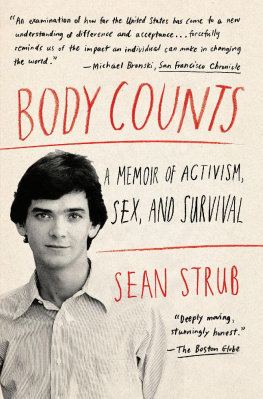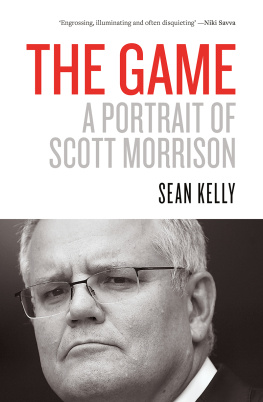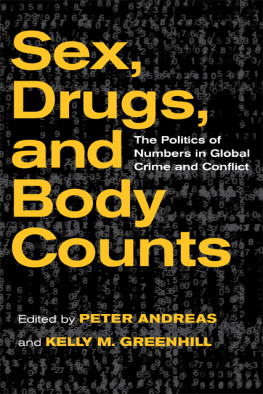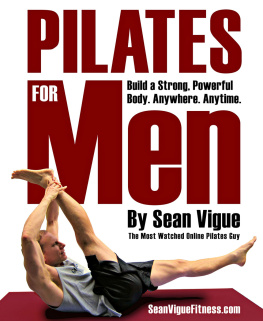Sean Strub - Body Counts
Here you can read online Sean Strub - Body Counts full text of the book (entire story) in english for free. Download pdf and epub, get meaning, cover and reviews about this ebook. year: 2014, publisher: Scribner, genre: Non-fiction. Description of the work, (preface) as well as reviews are available. Best literature library LitArk.com created for fans of good reading and offers a wide selection of genres:
Romance novel
Science fiction
Adventure
Detective
Science
History
Home and family
Prose
Art
Politics
Computer
Non-fiction
Religion
Business
Children
Humor
Choose a favorite category and find really read worthwhile books. Enjoy immersion in the world of imagination, feel the emotions of the characters or learn something new for yourself, make an fascinating discovery.
- Book:Body Counts
- Author:
- Publisher:Scribner
- Genre:
- Year:2014
- Rating:5 / 5
- Favourites:Add to favourites
- Your mark:
- 100
- 1
- 2
- 3
- 4
- 5
Body Counts: summary, description and annotation
We offer to read an annotation, description, summary or preface (depends on what the author of the book "Body Counts" wrote himself). If you haven't found the necessary information about the book — write in the comments, we will try to find it.
Body Counts — read online for free the complete book (whole text) full work
Below is the text of the book, divided by pages. System saving the place of the last page read, allows you to conveniently read the book "Body Counts" online for free, without having to search again every time where you left off. Put a bookmark, and you can go to the page where you finished reading at any time.
Font size:
Interval:
Bookmark:
Of the many good friends and advisers who helped me in the process of writing Body Counts , none deserve more appreciation than Walter Armstrong, who helped me from the first word of the initial proposal to the last word of the manuscript. For nearly twenty years, he has listened patiently to my ramblings and rants, deciphered my scribbles and screeds, and helped make sense of and give context to what I am trying to say with a kindness and patience that is almost superhuman.
I also owe a particular debt to Bob Levine, without whose encouragement and support I would not have written this book, and to Nan Graham, whose faith and confidence in me sometimes exceeded my own. Nans colleague, Paul Whitlatch, ably shepherded me through the editing process with patience and professionalism.
John Berendt, Jonathan Boorstein, Beverly Dyer, Elliott Millenson, Hillary Needleman, and Ken Siman went above and beyond the requirements of friendship in commenting and providing valuable suggestions on my many drafts, frequently on short notice or at odd hours. Several former POZ colleagues provided comments or advice that improved the manuscript significantly, including Sally Chew, Shawn Decker, Lauren Hauptman, Doug Ireland, Matt Levine, Manjula Martin, Ronnilyn Pustil, and Laura Whitehorn.
Im also grateful to Donald Baxter, Chip Beam, Edwin Bernard, Fred Bernstein, Richard Berkowitz, Jay Blotcher, John Catlett, Cindy Cesnalis, Cecilia Chung, Mario Cooper, Claudia Copquin, Chris Cormier, David Drake, Forest Evashevski, Annie Flanders, Greg Gorman, Krista Gromalski, Julia Gruen, Judy Harris, Alan Klein, James Krellenstein, Tami Haught, Carter Hooper, Vanessa Johnson, Dan Johnston, Ted Kerr, Christopher King, Mark King, Emily LaFond, Suzanne Levine, Christopher Makos, Bill Malson, Linda Meredith, Monique Moree, Liz Morten, Tim Murphy, Jim Nathan, Hillary Needleman, Gloria Nieto, Maya North, Janet Oliver, Torie Osborn, Nancy Pinchot, Richard Pleasants, Billy Reue, Nick Rhoades, Mike Rogers, Marilyn Rosenthal, Nelson Santos, Josh Sapan, Dick Scanlan, Stephen Schlanser, Linda Shankweiler, Aiden Shaw, Sara Simon, Laurel Sprague, Dick Snyder, Nathan Snyder, Cindy Stine, Missi Strub, Gilbey Strub, Robert Suttle, Kerry Thomas, Matt Vitemb, Jay Vithalani, Reed Vreeland, Max Westerman, Peter Wise, Bob Witeck, Bob Wykoff, and Angus Whyte for their support, comments, and friendship.
My appreciation to Xavier, Megan, my family, and other close friends cannot be adequately conveyed in an acknowledgment sentence at the back of a book. They, as much as any pill or potion, are what have pulled me through the last thirty years, enduring my lowest and weakest moments, and always at my side to celebrate the triumphant ones. AIDS has taught me a lot about love.
To Joe Sonnabend, and in more recent years, Paul Bellman, I only wish every person could enjoy the quality of doctoring I have received from each of you. Throughout an era when afflictions became commodities, bought and sold as profit opportunities, you have maintained the humanity, compassion, skepticism, and individualized care that is a credit to your profession.
The criminalization reform work I have undertaken through the Sero Project would not be possible without the support of John Swaner and Gregory Whiting, Tom Viola and his amazing team at Broadway Cares/Equity Fights AIDS; Henry van Ameringen, who recognizes injustice long before it is visible to others; and Scott Anderson and Matt Blinstrubas at the Elton John AIDS Foundation. Sir Eltons partner, David Furnish, saw the short film HIV Is Not a Crime , and met Nick Rhoades and Robert Suttle at my sister Gilbeys home in London. He was outraged and shared it with Sir Elton; they then provided funding that greatly expanded the Sero Projects work.
Finally, to everyone with HIV, especially those who have read POZ and followed or supported my work over the years, I am proud to be one of you. Not because having a virus is something to be proud of; that is perhaps an unfortunate accident or tragedy, but it is no accomplishment. But because those of us with HIV have learned something unique about society, survival, and ourselves that only we understand.

GREG GORMAN
SEAN STRUB is an activist, writer, and executive director of the Sero Project, which combats the criminalization of people with HIV. A native of Iowa City, Strub and his partner, Xavier Morales, live in New York and Milford, Pennsylvania, where he has been active in historic preservation and co-owns the historic Hotel Fauchre.
www.SeanStrub.com
MEET THE AUTHORS, WATCH VIDEOS AND MORE AT
SimonandSchuster.com
authors.simonandschuster.com/Sean-Strub
DISCOVER MORE GREAT BOOKS AT 
Elevator number one was Senators Only, and my job was to move senators up to the Senate floor in the U.S. Capitol and back to their offices as quickly as possible. From 1976 to 1978, for twenty hours a week, I manually opened and closed a shiny brass accordion-style gate at each floor, always with a friendly greeting. Whenever the gate squeaked or scraped, I would squirt a little oil on its metal joints. The interior of the antique elevator cab was polished walnut and rosewood, with a hand-operated cast-iron gearshift worn smooth by many decades of constant movement forward (Going up!) and back (Going down!). A small wooden folding seat was hinged against the wall, but I never used it. I preferred to stand and greet passengers eye to eye.
I had arrived in Washington from Iowa in March 1976, with a copy of Michael Harringtons The Other America in my suitcase, as a seventeen-year-old idealist determined to make my mark in the world. I wasnt sure what that might be, but I harbored political ambition and secretly thought I might go very far. My parents believed I went to Washington to attend Georgetown University that fall. A fine Jesuit school, my dad called it. But for me, the main attraction was the job ferrying members of the U.S. Senate up and down. It was a plum post for an eager young politico, and the pay was good. I also liked that my elevator was on the Senate side of the Capitol, the so-called upper chamber of Congress.
I was on a political fast track. When I had hit adolescence, and the attention of my male peers turned to girls, mine turned to politics. Thats how I lucked in to the elevator operator post. As a page in the Iowa State Senate in 1975, I often got rides from the capital in Des Moines to my parents house in Iowa City from a journalist, Frank Nye, who lived nearby in Cedar Rapids. Shortly before Christmas in 1975, he and his wife invited me to a dinner party at their house, where I met Iowas senator Dick Clark, one of the U.S. Senates most liberal members. I didnt realize Clark was an elected official until the dinner conversation turned to national politics. He seemed particularly well informed, so I asked him, Do you work in Washington?, prompting a humiliating burst of laughter from others at the table.
Despite my faux pas, Clark thought I showed promise and handed me his card with his executive assistants name scrawled on the back. Tell Bob I told you to call and see if we might be able to get you an appointment as a page, and maybe you could help out a bit in my office as an intern, he said. I left Clarks aide a message the next morning, saying I had already served as a page in the State Senate in Des Moines and was excited about the chance to work in Washington. When he called back, he said I was too old to be a pagethe cutoff was sixteenbut he would look into another patronage position for me, which turned out to be the elevator post.
Font size:
Interval:
Bookmark:
Similar books «Body Counts»
Look at similar books to Body Counts. We have selected literature similar in name and meaning in the hope of providing readers with more options to find new, interesting, not yet read works.
Discussion, reviews of the book Body Counts and just readers' own opinions. Leave your comments, write what you think about the work, its meaning or the main characters. Specify what exactly you liked and what you didn't like, and why you think so.












